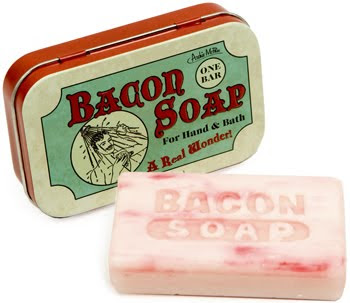Would you shave if you knew soap was made with deep fryer oil used by restaurants?
If yes, how much would you pay for such soap?
If yes, how much would you pay for such soap?
+1Used fryer oils are best left to the diesel fuel crowd.
Used fryer oils are best left to the diesel fuel crowd.

Yet another reason to avoid buying anything from that kook.
Mmmmm ... bacon!

When I worked fast food twenty some years ago there was a special dumpster for the used oil and grease from the grill. It was huge and probably took a month or more to fill one of the worst smells you could imagine. When I asked why the saved it I was told it was sold to make soap, I couldn't believe it. But then again ambergris comes from whale vomit and poop that washes up on shore, and has been used for expensive perfumes and even food for centuries.
Seems like a level headed guy to me.
How do I know some soap maker doesn't use recycled vegetable cooking oil, but isn't disclosing this practice?
I suspect many of the bath soaps you purchase are made from recycled cooking oils. That is how they can sell them for less than $1 a bar. Perhaps some cheap shaving soaps are made that way as well, but I won't sugggest any names. However, any artisan trying to extract $15 and up from a customer for a tub of soap would quickly lose customers due to variability of their product should they use recycled oils. They just are not consistent enough in fatty acid content to make a soap that is consistent in quality from batch to batch.
Yet another reason to avoid buying anything from that kook.